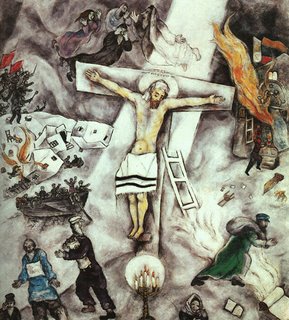There has also been some controversy about Madonna's upcoming televised concert special. When she sings the song "Live to Tell" during her current "Confessions" world tour, Madonna adorns a crown of thorns and climbs up on a cross in a mock crucifixion. Check out the pictures:


Conservative Christian groups have successfully forced Madonna and NBC to edit out the crucifixion when the concert is televised next month. Such groups in America and Europe have claimed that Madonna is committing blasphemy.
For her part, Madonna claims that she is not blaspheming at all. According to CNN.com, "Madonna issued a statement last month insisting her act was 'neither anti-Christian, sacrilegious or blasphemous. Rather it is a plea to the audience to encourage mankind to help one another and to see the world as a unified whole.' 'I believe if Jesus were alive today, he would be doing the same thing,' she said, adding that her specific intent was to bring attention to the extreme poverty in Africa."
You may recall that this is not the first time Madonna has stirred controversy regarding religious imagery. In her video for "Like a Prayer" way back in 1989 featured Madonna, with the stigmata of bloody palms, dancing in front of field of burning crosses while religious statues cried blood. I actually thought it was a good video.
Now all of this raises an interesting question: What constitutes blasphemy when it comes to using images of a cross or crucifixion?
To an extent, I think Madonna has a point. The cross is a symbol of redemptive suffering (if you believe in such a thing) and has been used in art to portray universal suffering. Have you seen Marc Chagall's "White Crucifixion" at the Art Institute? It uses a very Jewish Jesus on the cross to make a powerful statement about Jewish suffering. Is this blasphemy?

But on the other hand, I often wonder if Madonna simply pulls stunts like this just to get attention, whether it's for a cause or not. If that's the case, maybe it is blasphemy.
Blasphemy or not, this raises at least one more interesting question. I often notice that rock stars, rappers, and movies stars frequently wear crosses around their necks, often when doing things that the man who made that cross famous probably wouldn't approve of. I'm never really sure what that means. Is it a sign of faith? A talisman or charm for good luck? A fashion style? Or to the point of this discussion, is it blasphemy?
How many of us wear crosses? Do we always live our lives in a way that reflects what that cross means? It's a heavy burden. When Jesus said, "take up your cross and follow me", did he have in mind a Madonna concert or "do your chain hang low"? Or are we missing the point altogether?


